

Please don’t tell me I was lucky to be adopted. RESOURCES ON TRANSRACIAL ADOPTION. RESOURCES ON TRANSRACIAL ADOPTION. Real Talk on Race: How transracial adoptees find their identity - Montreal. Real Talk on Race is CBC Montreal's special series exploring personal conversations and experiences around race in the city.
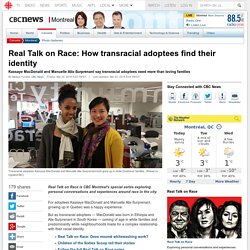
For adoptees Kassaye MacDonald and Manuelle Alix-Surprenant, growing up in Quebec was a happy experience. But as transracial adoptees — MacDonald was born in Ethiopia and Alix-Surprenant in South Korea — coming of age in white families and predominantly white neighbourhoods made for a complex relationship with their racial identity. "When I was a kid, I didn't even realize it was a transracial adoption," Alix-Surprenant said of growing up in Saint-Jean-sur-Richelieu. "I always considered myself as a white kid.
" For MacDonald, the realization that she was a different race from her parents hit her when her family ventured outside the "homogeneous white environment" of her small Eastern Township community. Lost Daughters: ROUND TABLE: Lost Daughters #FlipTheScript on Crowdfunding and the "Orphan Crisis" Today's Prompt: Many people view adoption as the best solution to the world’s so-called “orphan crisis.”
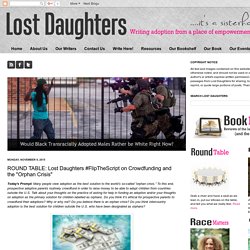
To this end, prospective adoptive parents routinely crowdfund in order to raise money to be able to adopt children from countries outside the U.S. Talk about your thoughts on the practice of asking for help in funding an adoption and/or your thoughts on adoption as the primary solution for children labelled as orphans. Do you think it’s ethical for prospective parents to crowdfund their adoptions?
Why or why not? Do you believe there is an orphan crisis? Julie Stromberg: I was adopted through the private, domestic infant adoption industry in the United States. As such, the entire notion of fundraising to adopt one "orphaned" child perplexes me. Kassaye: Adoption fundraisers make me uncomfortable because I feel like it's tied to the idea of saving and rescuing kids who, often times, are not real orphans.
Rosita González: Kassaye says this so well. Lost Daughters: Don’t be Scared: An Angry Black Woman Adoptee Speaks. “Anger is loaded with information and energy.”
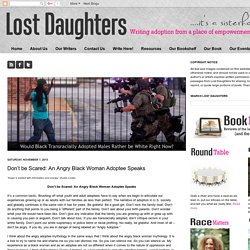
(Audre Lorde) Don’t be Scared: An Angry Black Woman Adoptee Speaks It’s a common tactic. Brushing off what youth and adult adoptees have to say when we begin to articulate our experiences growing up or as adults with our families as less than perfect. The narrative of adoption in society and globally continues in the same vein it has for years. I think about the angry adoptee mythology in the same ways that I think about the angry black woman mythology. There is so much fear here. . “. . . My anger is a response to racist attitudes, to the actions and pre-sumptions that arise out of those attitudes. In a time when #BlackLivesMatter is so central to how any of us think about how political action is taking place in our world it is important - as Lorde asks us - to consider our uses of adoptee anger. I am not afraid of my anger and I ask you who live in apprehension of our adoptee anger, our truths and our work (stories and research!)
Psmag. Five Hard Truths About Adoption Adoptive Parents don't want to Hear Adoptees.
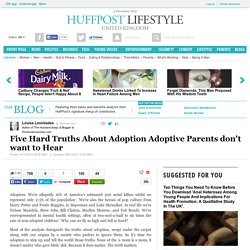
We're allegedly 16% of America's estimated 500 serial killers whilst we represent only 2-3% of the population1. We're also the heroes of pop culture from Harry Potter and Frodo Baggins, to Superman and Luke Skywalker. In real life we're Nelson Mandela, Steve Jobs, Bill Clinton, Marilyn Monroe...and Ted Bundy. We're overrepresented in mental health settings, often at two-and-a-half to six times the rate of non-adopted children2.
Why can we fly so high and fall so hard? Most of the analysis disregards the truths about adoption, swept under the carpet along with our origins by a society who prefers to ignore them. 1. Real is one of those words that denotes authenticity. But the relegation of my first real mother to the function of incubator by using the terms 'birth or biological mother' objectifies her, and diminishes her role and her importance in my heritage. Without my mother I would not be alive. 2. 3. ...even if you think I am. 4. 5. The answer is nothing. 1. ADOPTION, LE CHOIX DES NATIONS. Adoptees "Flip The Script" on National Adoption Month (Extended Version) Etats-Unis : cède enfant adopté, 10 ans, 3 500 $ hors taxe. Dylan sourit sur la photo.
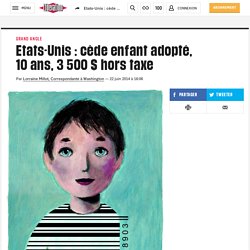
Il a 10 ans, le regard malicieux, et une passion pour le jardinage. «Il n’a pas été diagnostiqué hyperactif et ne prend pas de médicaments. Il est capable de bien se concentrer et il adore faire des puzzles», explique la page Facebook qui le présente à l’adoption. Même son «prix» est affiché : 3 500 dollars (2 600 euros) de frais d’agence, plus 200 dollars d’enregistrement et de 1 500 à 2 500 pour les avocats. Le tout déductible d’impôts, précise l’annonce publiée sur Second Chance Adoptions. Comme des dizaines d’autres enfants aux Etats-Unis, il est sur le «marché» de «seconde main» : le «rehoming» disent les Américains, même si le terme est controversé. «Les parents ne sont pas toujours bien préparés à des enfants qui peuvent être difficiles», explique Sandra Moats, qui en élève dix-neuf, dont dix «réadoptés» abandonnés par leurs premières familles américaines. «C’est notre croix à porter» Une simple procuration.